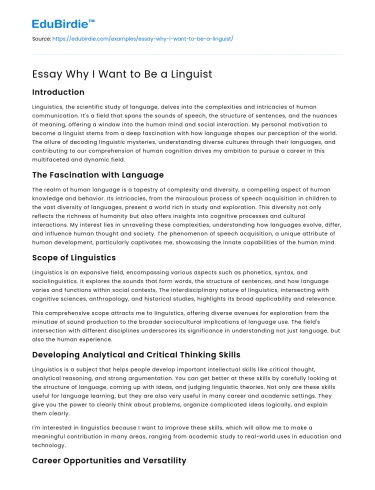Introduction
Linguistics, the scientific study of language, delves into the complexities and intricacies of human communication. It's a field that spans the sounds of speech, the structure of sentences, and the nuances of meaning, offering a window into the human mind and social interaction. My personal motivation to become a linguist stems from a deep fascination with how language shapes our perception of the world. The allure of decoding linguistic mysteries, understanding diverse cultures through their languages, and contributing to our comprehension of human cognition drives my ambition to pursue a career in this multifaceted and dynamic field.
The Fascination with Language
The realm of human language is a tapestry of complexity and diversity, a compelling aspect of human knowledge and behavior. Its intricacies, from the miraculous process of speech acquisition in children to the vast diversity of languages, present a world rich in study and exploration. This diversity not only reflects the richness of humanity but also offers insights into cognitive processes and cultural interactions. My interest lies in unraveling these complexities, understanding how languages evolve, differ, and influence human thought and society. The phenomenon of speech acquisition, a unique attribute of human development, particularly captivates me, showcasing the innate capabilities of the human mind.
Save your time!
We can take care of your essay
- Proper editing and formatting
- Free revision, title page, and bibliography
- Flexible prices and money-back guarantee
Scope of Linguistics
Linguistics is an expansive field, encompassing various aspects such as phonetics, syntax, and sociolinguistics. It explores the sounds that form words, the structure of sentences, and how language varies and functions within social contexts. The interdisciplinary nature of linguistics, intersecting with cognitive sciences, anthropology, and historical studies, highlights its broad applicability and relevance.
This comprehensive scope attracts me to linguistics, offering diverse avenues for exploration from the minutiae of sound production to the broader sociocultural implications of language use. The field's intersection with different disciplines underscores its significance in understanding not just language, but also the human experience.
Developing Analytical and Critical Thinking Skills
Linguistics is a subject that helps people develop important intellectual skills like critical thought, analytical reasoning, and strong argumentation. You can get better at these skills by carefully looking at the structure of language, coming up with ideas, and judging linguistic theories. Not only are these skills useful for language learning, but they are also very useful in many career and academic settings. They give you the power to clearly think about problems, organize complicated ideas logically, and explain them clearly.
I'm interested in linguistics because I want to improve these skills, which will allow me to make a meaningful contribution in many areas, ranging from academic study to real-world uses in education and technology.
Career Opportunities and Versatility
The field of linguistics opens doors to a diverse array of career opportunities, highlighting the versatility of a linguistics degree. In the industry, linguists contribute to advancements in speech recognition, artificial intelligence, and natural language processing. In the realm of education, they are instrumental in developing language teaching materials, designing assessments, and enhancing language instruction methodologies.
Additionally, linguists engage in language documentation and fieldwork, vital for preserving and understanding endangered languages. This broad spectrum of career paths underscores the relevance of linguistics in our increasingly global and multicultural societies. The ability to analyze and understand language equips linguists with unique skills that are highly sought after in various sectors, from technology to education to cultural preservation.
Challenges and Commitment
There are challenges to a future in linguistics, such as the need to keep learning and the need to navigate a competitive job market. Being successful in this area takes a lot of hard work, and linguists have to keep their knowledge up to date all the time because languages change. To do well in this fast-paced atmosphere, you need to be able to think critically, communicate clearly, and deal with stress. To do well in linguistics, you need to not only understand the ideas behind language but also be able to use them in different situations. This requires both intellectual rigor and the ability to adapt.
Conclusion
This essay has explored the allure, scope, and challenges of a career in linguistics. My enthusiasm for this field is driven by its vast opportunities, intellectual rigor, and potential for significant societal impact. Linguistics aligns seamlessly with my interests and goals, offering a fulfilling path to explore the complexities of human language.






 Stuck on your essay?
Stuck on your essay?

